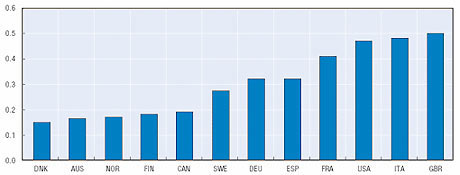The Guardian highlights an OECD report [PDF] which shows that the UK has the worst social mobility among developed OECED members:
Children from poor families in Britain have a greater chance of struggling on low incomes than their counterparts in the west's other rich countries, the Organisation for Economic Co-operation and Development (OECD) said today.Its rather graphically shown below:Highlighting the UK's lack of social mobility, the Paris-based thinktank said the chances of a young person from a less well-off family enjoying higher wages or getting a higher level of education than their parents was "relatively low".

Unfortunately there's no data in the report on New Zealand, and I haven't been able to find any on the web, but there seems to be a strong correlation between NeoLiberalism and low social mobility, which isn't a good sign. New Zealand also has a very strong relationship between parental socioeconomic background and educational achievement (see the graph on p. 188), which given the causal model they lay out, suggests our mobility will be more like the US and UK than Australia or Sweden.
As for what to do about it, the report has this to say:
Education policies play a key role in explaining observed differences in intergenerational social mobility across countries. For example, higher enrolment in early childhood education is associated with a lower influence of parental background on students’ achievement in secondary education. By contrast, school practices that group students into different curricula at early ages come with less social mobility in educational achievement. Moreover, increasing the social mix within schools appears to boost performance of disadvantaged students without any apparent negative effects on overall performance.Unfortunately, our government is doing the opposite, treating ECE as babysitting rather than real education, and increasing subsidies to snob schools so the rich can exclude themselves from society (oh, and cutting taxes for the rich and raising them on the poor, reducing redistribution, as well). But then, they're not interested in social mobility. Rather, they're interested in protecting and enhancing the privilege of the rich, by stamping on the fingers of the poor.Redistributive and income support policies seem to be associated with greater intergenerational social mobility.





